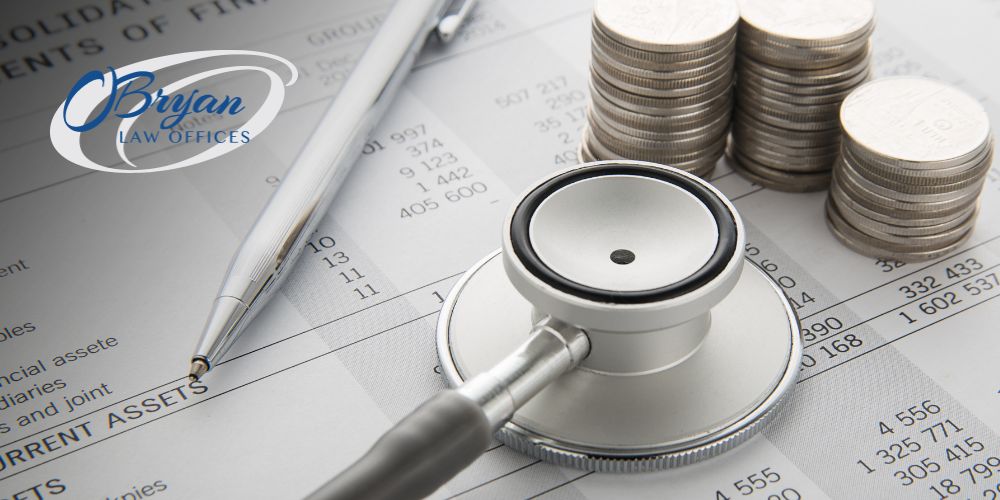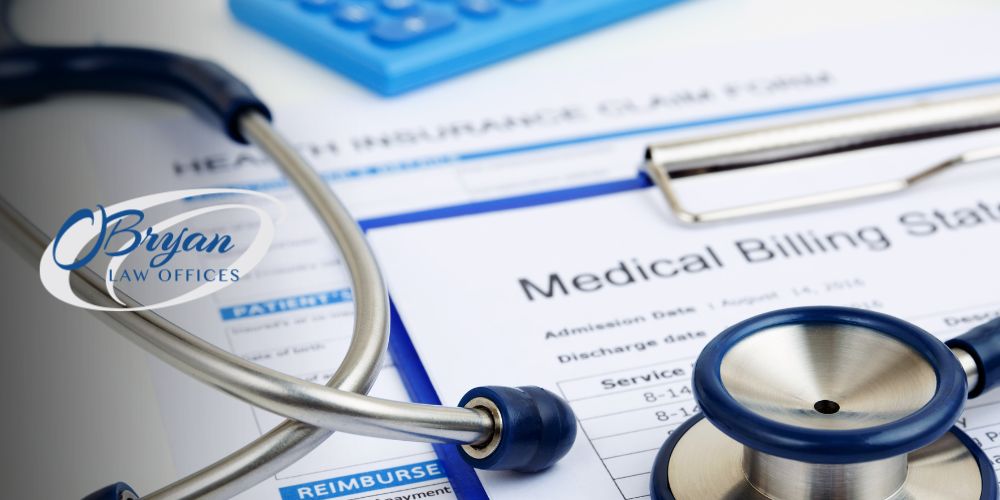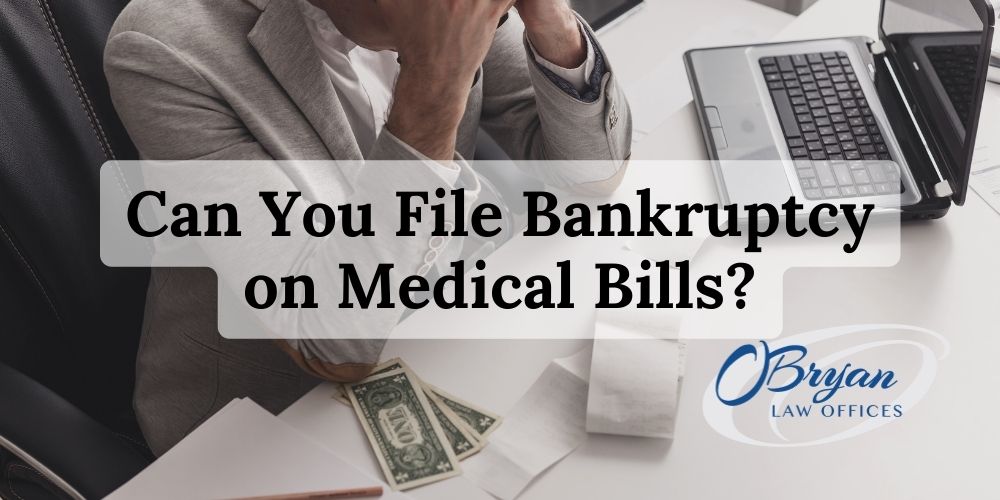The cost of healthcare is a problem for a lot of Americans. Life-saving medical treatment can put someone in enormous debt, even those fortunate enough to have health insurance coverage. Unpaid medical bills can negatively affect your credit score. This affects your ability to apply for a personal loan or financial assistance. That’s why many people decide to file for bankruptcy to eliminate medical debt.
If you are considering bankruptcy as a debt relief option, you may have a lot of questions. Does bankruptcy affect your credit report? What chapter of bankruptcy should you file for? How many bankruptcies in the U.S. are medical bill related? In this article, we’ll explain the process and give you an overview of what to expect when filing for bankruptcy.
Filing for bankruptcy is a complicated process, and can require help from a bankruptcy attorney and/or credit counselor. If you are one of the many Americans struggling to pay medical debt and are considering filing for bankruptcy, the Louisville bankruptcy attorneys at O’Bryan Law Offices are here to help. Our experienced lawyers can help you file for either Chapter 7 or Chapter 13 bankruptcy. We can also take you through the medical bankruptcy process. Call us at 502-400-4020 for a free consultation on your bankruptcy case.
Do You Have Overwhelming Medical Debt?
A medical emergency can change your life in physical, emotional, and financial ways. Both insured and uninsured patients may avoid seeking medical care for fear of accumulating debt. If you have unpaid medical debt that you just can’t seem to pay, or debt collectors are constantly hounding you about your medical bills, there are a few medical debt relief options you can explore. One of which is what’s commonly known as “medical bankruptcy.”
Bankruptcy can offer you a new beginning, but the process can be costly. It can take months or even years to receive your bankruptcy discharge. If your debt is relatively low, it may be better to negotiate with your creditors and agree on a repayment plan. Unfortunately, debt collectors can take advantage of those without experienced representation.
That’s why it’s important to talk to a bankruptcy lawyer to discuss the best debt management plan for your situation. If you are considering filing for bankruptcy because of overdue medical bills, the Kentucky bankruptcy lawyers at O’Bryan Law Offices are prepared to help you find the best solution to your debt problem.
Medical Debt Statistics
Unpaid medical bills can be a major cause of stress for millions of people across the country, and the costs of medical care are only increasing. One study estimated that about 17.8% of Americans had medical debt in collections and listed medical debt as the largest source of debt in collections nationwide.
What Percentage of Bankruptcies Are Because of Medical Bills?
A study by The American Journal of Medicine outlined the percentages of medical bankruptcies in the U.S. over the past few decades. In 1981, only 8% of bankruptcy filings were because of medical bills. However, In 2007, unpaid medical bills were the reason for over 69% of bankruptcy filings.
Even with the expansion of federal assistance programs under the Affordable Care Act, the number of bankruptcy proceedings filed over medical expenses has only increased since that study was conducted. In a 2019 study by the American Public Health Association, researchers found that 58.5% of those who filed for bankruptcy that year stated that medical bills were a factor in their decision to file bankruptcy.
Can You Lose Your House Due to Medical Debt?

Filing for medical bankruptcy can help you eliminate your medical debt, but you may also lose some assets in the process, depending on which chapter of bankruptcy you choose to file under. We’ll go into the differences between Chapter 7 and Chapter 13 bankruptcies later, but for now, let’s talk about secured and unsecured debt.
A debt is considered to be secured if the borrower offers a personal asset as collateral for the loan. This can include personal property like a home or car. If the borrower cannot pay off their loan within the repayment period, and they have secured debt, the lender may seize the asset or assets the borrower pledged as collateral.
Unsecured debts, however, are debts without any collateral attached. Luckily, medical debt is considered unsecured debt, meaning that if you don’t pay your medical bills, your medical provider can’t seize your home in an attempt to cover the costs of your medical debt. In some rare cases, however, assets may be attached to your medical expenses. An experienced bankruptcy law firm can help those in medical debt communicate and negotiate with both secured and unsecured creditors.
Does Medical Debt Affect Your Credit Differently Than Other Debts?
Like all debts, unpaid medical debt can have a negative impact on your credit score. Very recently, however, the three biggest national credit reporting companies have removed all paid debt from consumer credit reports. Additionally, they have removed unpaid medical bills under $500 from credit reports, meaning those smaller debts will not negatively impact your credit score.
If you have medical bills exceeding $500 or medical bills that are more than a year overdue, you may want to take a look at your credit score and see how those debts are affecting it. A credit counselor can help you better understand how your debts are affecting your credit report and how to improve your overall credit score.
Oftentimes, people avoid filing for bankruptcy for fear of ruining their credit score. After all, bankruptcy can stay on your credit report for up to seven years or more. There are, however, ways to restore your credit in the wake of bankruptcy. Call the bankruptcy lawyers at O’Bryan Law Offices to learn more about what we can do for you in order to improve your credit after filing bankruptcy.
You Can File Bankruptcy on Medical Bills

If your monthly income is not enough to make reasonable monthly payments towards your unpaid bills, or the payments your lender is demanding would leave you with no money remaining to cover basic living costs, you may want to consider filing for bankruptcy. There are advantages and disadvantages to filing bankruptcy, but it may be the best decision for you and your situation. O’Bryan Law Offices are here to help you weigh your options and, if you decide on filing for bankruptcy, we’ll help you through the process. Contact us online to get in touch with one of our Kentucky bankruptcy professional.
Advantages of Clearing Medical Debt in Bankruptcy
Filing personal bankruptcy for health care expenses can improve your financial situation and also relieve you of the stress of having outstanding medical debts. It can also make it easier to seek health care in the future, now that you won’t be increasing any existing debt.
What Happens to Other Debts When You File Bankruptcy on Medical Debt?
Filing for medical bankruptcy not only offers medical debt relief, but it can also relieve you of your other debts, including any credit card debt or debt from personal loans. Bankruptcy filings can also relieve you of all your bills. So, you can wipe out things like unpaid tax bills and utility bills in your bankruptcy case.
What Chapter of Bankruptcy Is Best for Medical Bills?

Medical bankruptcies can be filed under two different chapters of the bankruptcy code: Chapter 7 and Chapter 13. Both have their advantages and disadvantages, so it’s important to understand the process fully so you can weigh your options.
Chapter 7 Bankruptcy
Chapter 7 bankruptcy is often referred to as “liquidation bankruptcy.” Liquidation is the process by which someone converts your assets to cash. These assets are then distributed to creditors, but not all creditors are treated equally. Under bankruptcy law, debts that are more important have a higher priority than other, less-important debts.
These are called priority debts. They are usually the first debts you pay off using your liquid assets in a Chapter 7 filing. Things like student loans, alimony, and child support have priority over other debts.
After you pay off all of the priority debt in a consumer bankruptcy case, you can then pay off any remaining debt. Suppose you don’t have any money left over after paying those priority debts, however. Those creditors receive nothing, and the court discharges the debt. Medical debt is not a priority debt, meaning that in a Chapter 7 bankruptcy, they are usually one of the last things to receive payment in a bankruptcy proceeding. This can have some additional consequences. If you owe money to a specific healthcare provider, like a family doctor, and you file bankruptcy, that specific provider can refuse to continue treating you.
Considering that medical provider may have just lost the ability to collect any money from you for their past services, it makes sense that they may no longer want to provide you with service in the future. It’s not impossible to rebuild or protect that relationship, though. Some people may choose to pay medical debt after filing bankruptcy just to continue to have a relationship with a specific doctor or any other medical providers they were in debt to.
Additionally, if you file bankruptcy under Chapter 7 and you were previously in debt to a hospital, that hospital cannot refuse to treat you after bankruptcy like an individual doctor can. This ensures you are able to receive life-saving care in an emergency, despite your debt history.
While Chapter 7 is the most widely-used form of bankruptcy when dealing with outstanding medical debt, you have to qualify in order to file. People looking to file Chapter 7 bankruptcy have to pass a “means test,” which evaluates their monthly income in the months leading up to when they’re trying to file. If their earnings are below the state’s median income, they qualify. If not, they may have to file for Chapter 13 bankruptcy.
Chapter 13 Bankruptcy
Chapter 13 of the bankruptcy code is different from Chapter 7. In a Chapter 13 bankruptcy, debtors negotiate with creditors to devise a repayment plan to cover their medical debt. Most people file under Chapter 13 simply because they don’t qualify to file under Chapter 7. If someone earns over a certain amount of money, they have disposable income. They can use that income to make monthly payments towards their medical debt.
Chapter 13 can also help debtors retain a relationship with their healthcare providers. One main disadvantage, however, is the length of time it takes to finally receive a bankruptcy discharge. Most Chapter 13 bankruptcies last about three to five years. Additional debt incurred after filing bankruptcy will still exist, so you may continue to pay creditors for years after that.
When Is the Right Time to File Bankruptcy on Medical Bills?

Many people only consider bankruptcy as a last resort, which is entirely reasonable. Maybe you cannot keep up with a reasonable payment plan to cover your medical bills. Or maybe debt collectors are causing you a lot of grief. Filing bankruptcy under Chapter 7 or Chapter 13 could help you erase your debt.
You may also want to file for bankruptcy if your creditors are threatening legal action against you. Your healthcare provider could sue you over your outstanding bills to try and win a money judgment in bankruptcy court. If they win in court, the creditors could seize your assets or garnish your wages to pay your debt. Luckily, filing for bankruptcy can stop the lawsuit entirely.
How Can a Bankruptcy Lawyer Help You?

If you are unable to pay medical bills, a bankruptcy lawyer can help advise you on what you should do based on your specific set of circumstances. They can help you decide between filing for bankruptcy under Chapter 7 rather than Chapter 13, and vice versa. A bankruptcy attorney may even help you negotiate with creditors to set up a repayment plan so you can avoid filing for bankruptcy altogether.
Our experienced bankruptcy attorneys know how to navigate the Kentucky bankruptcy process and can help you avoid future legal problems. Speaking of legal troubles, our attorneys can also defend you in bankruptcy court. If you plan to file for bankruptcy, find an attorney with years of experience. They should have experience helping clients manage debt.
Contact a Kentucky Bankruptcy Attorney at O’Bryan Law Offices Today
Even with insurance coverage, many Americans struggle to pay medical bills. Also, many have other debts or expenses that take priority over medical debts, like child support. Outstanding debts could also prevent people from seeking necessary medical care, which could ultimately cost them something priceless: their life.
O’Bryan Law Offices is proud to provide debt relief counsel and bankruptcy assistance to those looking for debt relief. If you are considering bankruptcy, or you have been threatened with legal action, call us at 502-400-4020. We provide a free initial consultation to all clients. You can get advice from bankruptcy experts on what to do next.







